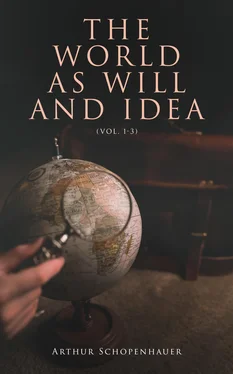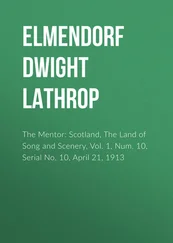Arthur Schopenhauer
The World as Will and Idea (Vol. 1-3)
Complete Edition
Translator: Richard Burdon Haldane, John Kemp
e-artnow, 2020
Contact: info@e-artnow.org
EAN: 4064066398927
Volume 1 Volume 1 Table of Contents Translators' Preface. Preface To The First Edition. Preface To The Second Edition. First Book. The World As Idea. First Aspect. The Idea Subordinated To The Principle Of Sufficient Reason: The Object Of Experience And Science. Second Book. The World As Will. First Aspect. The Objectification Of The Will. Third Book. The World As Idea. Second Aspect. The Idea Independent Of The Principle Of Sufficient Reason: The Platonic Idea: The Object Of Art. Fourth Book. The World As Will. Second Aspect. The Assertion And Denial Of The Will To Live, When Self-Consciousness Has Been Attained.
Volume 2
Volume 3
Table of Contents Table of Contents Volume 1 Volume 1 Table of Contents Translators' Preface. Preface To The First Edition. Preface To The Second Edition. First Book. The World As Idea. First Aspect. The Idea Subordinated To The Principle Of Sufficient Reason: The Object Of Experience And Science. Second Book. The World As Will. First Aspect. The Objectification Of The Will. Third Book. The World As Idea. Second Aspect. The Idea Independent Of The Principle Of Sufficient Reason: The Platonic Idea: The Object Of Art. Fourth Book. The World As Will. Second Aspect. The Assertion And Denial Of The Will To Live, When Self-Consciousness Has Been Attained. Volume 2 Volume 3
Translators' Preface. Translators' Preface. Table of Contents The style of “Die Welt als Wille und Vorstellung” is sometimes loose and involved, as is so often the case in German philosophical treatises. The translation of the book has consequently been a matter of no little difficulty. It was found that extensive alteration of the long and occasionally involved sentences, however likely to prove conducive to a satisfactory English style, tended not only to obliterate the form of the original but even to imperil the meaning. Where a choice has had to be made, the alternative of a somewhat slavish adherence to Schopenhauer's ipsissima verba has accordingly been preferred to that of inaccuracy. The result is a piece of work which leaves much to be desired, but which has yet consistently sought to reproduce faithfully the spirit as well as the letter of the original. As regards the rendering of the technical terms about which there has been so much controversy, the equivalents used have only been adopted after careful consideration of their meaning in the theory of knowledge. For example, “Vorstellung” has been rendered by “idea,” in preference to “representation,” which is neither accurate, intelligible, nor elegant. “Idee,” is translated by the same word, but spelled with a capital—“Idea.” Again, “Anschauung” has been rendered according to the context, either by “perception” simply, or by “intuition or perception.” Notwithstanding statements to the contrary in the text, the book is probably quite intelligible in itself, apart from the treatise “On the Fourfold Root of the Principle of Sufficient Reason.” It has, however, been considered desirable to add an abstract of the latter work in an appendix to the third volume of this translation. R. B. H. J. K.
Preface To The First Edition.
Preface To The Second Edition.
First Book. The World As Idea.
First Aspect. The Idea Subordinated To The Principle Of Sufficient Reason: The Object Of Experience And Science.
Second Book. The World As Will.
First Aspect. The Objectification Of The Will.
Third Book. The World As Idea.
Second Aspect. The Idea Independent Of The Principle Of Sufficient Reason: The Platonic Idea: The Object Of Art.
Fourth Book. The World As Will.
Second Aspect. The Assertion And Denial Of The Will To Live, When Self-Consciousness Has Been Attained.
Table of Contents
The style of “Die Welt als Wille und Vorstellung” is sometimes loose and involved, as is so often the case in German philosophical treatises. The translation of the book has consequently been a matter of no little difficulty. It was found that extensive alteration of the long and occasionally involved sentences, however likely to prove conducive to a satisfactory English style, tended not only to obliterate the form of the original but even to imperil the meaning. Where a choice has had to be made, the alternative of a somewhat slavish adherence to Schopenhauer's ipsissima verba has accordingly been preferred to that of inaccuracy. The result is a piece of work which leaves much to be desired, but which has yet consistently sought to reproduce faithfully the spirit as well as the letter of the original.
As regards the rendering of the technical terms about which there has been so much controversy, the equivalents used have only been adopted after careful consideration of their meaning in the theory of knowledge. For example, “Vorstellung” has been rendered by “idea,” in preference to “representation,” which is neither accurate, intelligible, nor elegant. “Idee,” is translated by the same word, but spelled with a capital—“Idea.” Again, “Anschauung” has been rendered according to the context, either by “perception” simply, or by “intuition or perception.”
Notwithstanding statements to the contrary in the text, the book is probably quite intelligible in itself, apart from the treatise “On the Fourfold Root of the Principle of Sufficient Reason.” It has, however, been considered desirable to add an abstract of the latter work in an appendix to the third volume of this translation.
R. B. H.
J. K.
Preface To The First Edition.
Table of Contents
I propose to point out here how this book must be read in order to be thoroughly understood. By means of it I only intend to impart a single thought. Yet, notwithstanding all my endeavours, I could find no shorter way of imparting it than this whole book. I hold this thought to be that which has very long been sought for under the name of philosophy, and the discovery of which is therefore regarded by those who are familiar with history as quite as impossible as the discovery of the philosopher's stone, although it was already said by Pliny: Quam multa fieri non posse, priusquam sint facta, judicantur? (Hist. nat. 7, 1.)
According as we consider the different aspects of this one thought which I am about to impart, it exhibits itself as that which we call metaphysics, that which we call ethics, and that which we call æsthetics; and certainly it must be all this if it is what I have already acknowledged I take it to be.
A system of thought must always have an architectonic connection or coherence, that is, a connection in which one part always supports the other, though the latter does not support the former, in which ultimately the foundation supports all the rest without being supported by it, and the apex is supported without supporting. On the other hand, a single thought , however comprehensive it may be, must preserve the most perfect unity. If it admits of being broken up into parts to facilitate its communication, the connection of these parts must yet be organic, i.e., it must be a connection in which every part supports the whole just as much as it is supported by it, a connection in which there is no first and no last, in which the whole thought gains distinctness through every part, and even the smallest part cannot be completely understood unless the whole has already been grasped. A book, however, must always have a first and a last line, and in this respect will always remain very unlike an organism, however like one its content may be: thus form and matter are here in contradiction.
Читать дальше












